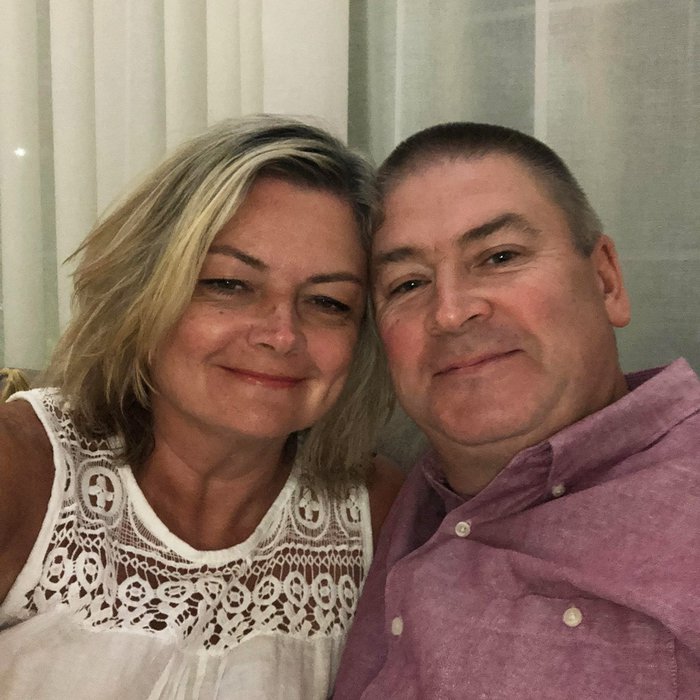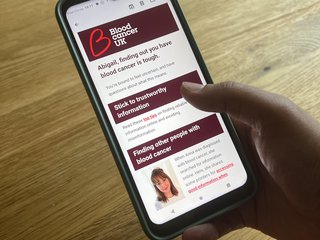Overcoming my feelings of isolation
Lynn, 55, was first diagnosed with classical Hodgkin lymphoma in 1995. She’s had lymphoma five times since then and a variety of treatments, including chemotherapy and a stem cell transplant.

Lynn, 55, was first diagnosed with classical Hodgkin lymphoma in 1995. She’s had lymphoma five times since then and a variety of treatments, including chemotherapy and a stem cell transplant.
When I was diagnosed, I felt that someone had rowed me out to an island and just left me there – I was totally alone, on another planet. I felt that no one understood.
I could be in a crowd and feel on my own. You feel like you’re a member of this really strange club that you don’t want to be in. And everybody knows you’re in that club because when you go out you’ve got a scarf on, a hat, you’ve got no hair, no eyebrows, or eyelashes.
Even though I was lonely, I was also the centre of attention for all the wrong reasons. So sometimes I didn’t want to go out. I had to force myself because I didn’t want everyone to talk about me and my illness all the time.
I’ve got a really good husband who was by my side through it all but I still felt alone because he couldn’t really understand what was going on. I even had some friends who I had known since primary school who just didn’t come near me. Probably because they didn’t know what to say about the cancer, so they didn’t say anything.
When I was first diagnosed there weren’t any forums or Facebook, but when I went to hospital for my monthly check-up I would see the same people. You strike up a relationship and say, “Guess what happened to me?” and they say, “Well yes, that happened to me as well” – even if it’s the weirdest side effect. Talking to someone that knows really helps.
You do take it all upon yourself and think no one’s interested. But I would say to others – don’t try to be strong, just share it with someone.
Accepting help and supporting others
Even though I have had some friends desert me, I’ve also had people, perfect strangers, who have come into my life and taken charge of it. The woman down the road did that for me, just simple things, like walking the dog. She’ll do anything for me and that’s really nice – take that help if you can get it.
Now I try to do the same. One of my close friends has been told that there is nothing else the doctors can do for her cancer. So I phoned her up and said, “I don’t know what to say to you. I really don’t know how you’re feeling or anything, but should I come round?” And I just went round, took her some shopping and let her talk.
If you’re supporting someone with cancer just text, to say that you’re thinking of them. Even if you don’t get a reply, keep at it! Also, don’t ask them if you can do anything for them, they’ll just say no. When you visit, take a dinner that can be warmed up. This takes pressure off their carer too. If there’s washing, do it. Or just bleach the toilet. It’s the little things that really help.
Having things to look forward to
I remember when I was in hospital for the stem cell transplant, every night we’d go to the theatre, go out for a meal or do something really special – and that helped lift my spirits. I didn’t want to just sit inside and wallow.
Even now, I make sure I keep up with ‘normal’ life and my family. I go and watch football – we support Southend United. Last weekend we went to an away game and made a weekend of it.
We do like our holidays, even if it’s just in the UK. My husband understands that it’s nice to get away and reconnect, because we’ve spent so much time in hospital together. We’ve tried to plan something for the end of every treatment. When I was diagnosed again in May 2004, my husband booked us a holiday in Dubai for December. I thought he was crazy and reckless and was wasting his money. But he said it would give us something to look forward to and keep me going. “What if I die?” I asked. “I’ll ask for my money back!” he said.
We have had some great laughs about, and during, our hospital stays. You’ve got to keep a sense of humour – we named one of my tumours Larry. He sat on my shoulder so was hard to miss!
Having something to get up for
When I was first diagnosed, my daughter was four, and a few months later she was starting school. So, what could I do? I couldn’t just fold up. I had this little girl to look after. I think it definitely helps when you’ve got something to get up for. I could see you could easily just give into it, and I don’t blame anyone who does that.
But I missed a lot when my daughter was growing up, and now I’m determined not to miss anything. It was her wedding in August and, no matter what happened, I was going to be there with her. It was a fantastic day for me. Having missed so many other major milestones in her life, it was wonderful to finally make this one. As she herself said, when I relapsed in 2007, “How many times can you get away with it, Mum?
I remember at one point during the wedding day, suddenly becoming overwhelmed and stunned that it was actually happening and that I’d made it. I sat down and just looked around at everybody enjoying themselves and was so grateful.
Janssen-Cilag Ltd has supported Blood Cancer UK with funding for the production of this web page and others within the ‘Living well’ section. It had no influence over the content.

Get a weekly support email from us
We'll send you clear and simple information, practical tips, and advice from other people with blood cancer, to help during the first few weeks and months after diagnosis.
